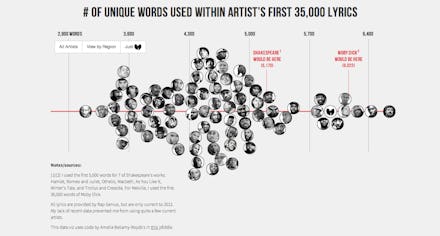Is Your Favorite Rapper Smarter Than Shakespeare?

Shakespeare invented a lot of modern slang, but nobody would ever say he spoke "less-than-acceptable English." He wrote raucous, raunchy plays for all classes, but nobody ever said he was making "a soundtrack for antisocial behavior." He was lewd, but Al Sharpton never said his plays were "dehumaniz[ing]." No play is taught more frequently in high school than Romeo and Juliet. It might seem ridiculous to ask that Wu-Tang's Enter the Wu-Tang get the same treatment. But when a data scientist did a statistical breakdown on the bard and our greatest rappers last week, he discovered something revolutionary.
Matt Daniels, New York City-based data scientist and hip-hop fanatic, wants to take on the assumptions behind the percieved division between classic literature and modern hip-hop. Daniels recently launched an interactive data visualization, titled "The Largest Vocabulary in Hip-Hop", to answer a simple question: Are any rappers measurably as good at wordsmithing as the Great Bard? His results will surprise even hip-hop's most vocal critics.
Image Credit: Matt Daniels
Daniels took the most celebrated playwright in English literature and looked at the first 5,000 words from seven of his most well-known plays, some 35,000 words in total. Daniels found 5,170 unique words in that subset of Shakespeare. Across all his plays, the Bard used 28,829 words. That means he had a vocabulary of more than 100,000 words. Not too shabby, considering most people know somewhere around 30,000 to 40,000.
Yet Shakespeare's vocabulary is surpassed by some of the most celebrated rappers of our day. If you look at the first 35,000 words in the lyrics of a rapper's career, you get the same sense of their range: Wu-Tang's GZA, Black Thought from The Roots, Aesop Rock and Outkast have all out-rhymed the Bard during their careers. Awkwardly for professors of literature everywhere, so have the CunninLynguists. Check out the full interactive here.
But while Shakespeare is taught in every school aligned with the Common Core State Standards Initiative (he is the only required author on the Common Core), hip-hop is often seen as corrosive to a child's education — a force to turn good kids bad.
That's not always the case. Research has proven that high levels of verbal fluency usually equate to higher IQ scores. A handful of sociolinguists have even praised rappers for the fascinating ways they "devise innovative ways to slice the system with the syntax." And while children from lower socioeconomic classes usually enter the classroom knowing 600 fewer words than children from higher socioeconomic situations, that a gap that usually increases to 4,000 words by second grade. But this must be the rappers' fault — not the American school system's.
This is one of the strongest signs yet that hip-hop needs to be taken seriously as literature and real art. Some academics have been making this argument for some time: Harvard University has developed a new hip-hop fellowship program designed to promote the form as a positive influence on society. As University of Colorado professor Adam Bradley has argued that hip-hop teaches poetic concepts and literary devices with the same effectiveness as some of the greatest poetry in Western culture, stressing that "the best MCs — like Rakim, Jay-Z, Tupac and many others — deserve consideration alongside the giants of American poetry. We ignore them at our own expense."
The best rappers have the biggest vocabularies, and they're saying real things with them. It's time America actually listened.